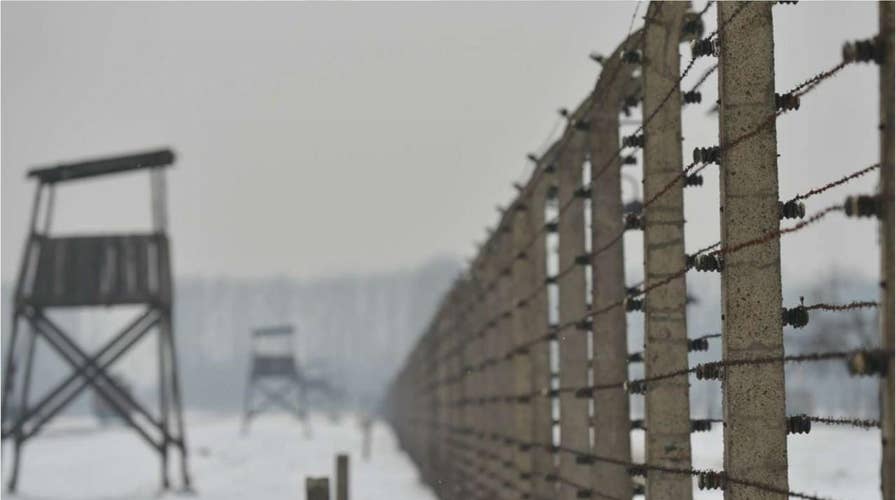Thursday is Holocaust Remembrance Day
Nazi Germany's eradication of European Jews during the Holocaust featured a much more ruthlessly efficient 'kill rate' than previously understood — according to new research.
Thursday is Yom HaShoah – Holocaust Remembrance Day – when we remember the 6 million Jews murdered by the Nazis. But while the Holocaust ended 74 years ago with the defeat of the Nazis in War II, anti-Semitism has not disappeared.
This year Yom HaShoah comes just days after a Jewish woman was shot and killed at a synagogue in Poway, Calif., and six months after 11 Jews were murdered at a synagogue in Pittsburgh in the worst case of anti-Semitic violence in American history.
It is clear there is still much work to be done to rid the world of anti-Semitism, an ancient form of hatred that refuses to die.
Here in the U.S., research by the Anti-Defamation League has found a 57 percent increase in anti-Semitic incidents since 2016. And in Europe, poisonous anti-Semitism has taken an even deeper hold.
In the two years since Austrian Chancellor Sebastian Kurz was elected, he has taken a number of important steps to reverse the troubling trend of increased anti-Semitism, as well as the overall hesitancy in Austria to fully own up to its role in the Holocaust.
In the past year, Kurz led a conference titled “An End to Anti-Semitism” and invited Holocaust survivors to a parliamentary commemoration of the 80th anniversary of Kristallnacht – a night of widespread deadly violence against Jews in Nazi Germany and Austria, including attacks on over 1,000 synagogues and about 7,500 Jewish-owned businesses.
Ultimately, the answer to how we might combat ignorance about the Holocaust – and to an extent, the pervasiveness of anti-Semitism and neo-Nazism – is through comprehensive, mandatory education.
While the Jewish community is encouraged by the steps Kurz has taken against anti-Semitism, many people are worried about his close connections to the far-right Freedom Party, which has been accused of praising Adolf Hitler and calling Jews “subhuman.”
In fact, the Freedom Party was founded by a former Nazi SS officer, Anton Reinthaller, who reached the rank of major general for his leadership during the Nazi annexation of Austria.
Given this troubling context, it seems as through Kurz’s gestures are intended to obscure the growing normalization of anti-Semitism and xenophobia within Austria and across Europe.
To track these patterns, the Jewish Conference on Material Claims Against Germany hired my firm, Schoen Consulting, to conduct a study on Austrian Holocaust knowledge and awareness.
The results are extraordinarily disturbing.
Foremost, our research revealed that there are critical gaps in Holocaust knowledge among
Austrian adults in a number of areas. Specifically, there are misconceptions about the Holocaust death toll, as well as a lack of familiarity with Nazi concentration camps and ghettos.
But this lack of basic Holocaust knowledge is not a uniquely Austrian phenomenon.
This latest study comes on the heels of two other studies conducted by my firm in the United States and Canada. Both of these studies revealed critical gaps in basic Holocaust knowledge and awareness, as well as a direct correlation between Holocaust knowledge and the likelihood to oppose Nazism.
The results of our Austrian study reveal that Holocaust ignorance is not unique to North America.
Some 63 percent of all Austrian respondents agree that “fewer people seem to care about the Holocaust today than they used to.” In examining the results of our study, it is abundantly clear why this is the case.
More than one-third of Austrians overall, and 42 percent of Austrians under the age of 35, believe that 2 million or fewer Jews were killed during the Holocaust. Moreover, only 44 percent of all Austrian respondents were able to correctly identify that 6 million Jews were murdered during the Holocaust.
Similarly, only slightly more than half of Austrians are aware of the infamous Mauthausen concentration camp, despite the fact that it was located just 100 miles from Vienna.
The attitudinal results of this lack of knowledge are clear: two-thirds of respondents agree that there is anti-Semitism in Austria today.
Remarkably, almost one-third of respondents believe that something like the Holocaust could happen in Austria today. Even more shockingly, 58 percent say that something like the Holocaust could happen in other European countries today, while 47 percent said it could happen in the U.S.
Finally, 36 percent of Austrian adults believe that there are a great deal or many neo-Nazis in Austria today. This figure itself is shocking, but notably stark compared to the 50 percent of Austrians who believe there are many neo-Nazis in the United States today.
Ultimately, the answer to how we might combat ignorance about the Holocaust – and to an extent, the pervasiveness of anti-Semitism and neo-Nazism – is through comprehensive, mandatory education.
Fortunately, as we saw in the U.S. and Canada, a majority of Austrians believe that it is important to teach about the Holocaust – in part so there is never another Holocaust.
Ultimately, the overall acceptance of these beliefs underscores a general consensus that if we are not dutifully vigilant and active in combating anti-Semitism by improving Holocaust education, the possibility of another hateful atrocity is not far off.
CLICK HERE TO GET THE FOX NEWS APP
It is imperative that countries around the world expand teacher training and administer standardized lesson plans covering a broad range of topics.
Though many may agree that fewer people care about the Holocaust than they used to, it is not too late to reverse this trend. The answer is simple. The answer is education.
Editor’s Note: The Conference on Jewish Material Claims Against Germany commissioned Schoen Consulting to conduct a comprehensive national study of Holocaust knowledge and awareness in Austria. Schoen Consulting conducted 1,000 interviews with Austrian adults ages 18 and over from Feb. 22 to March 1 this year. The margin of error for all respondents is plus or minus 3.1 percent.

